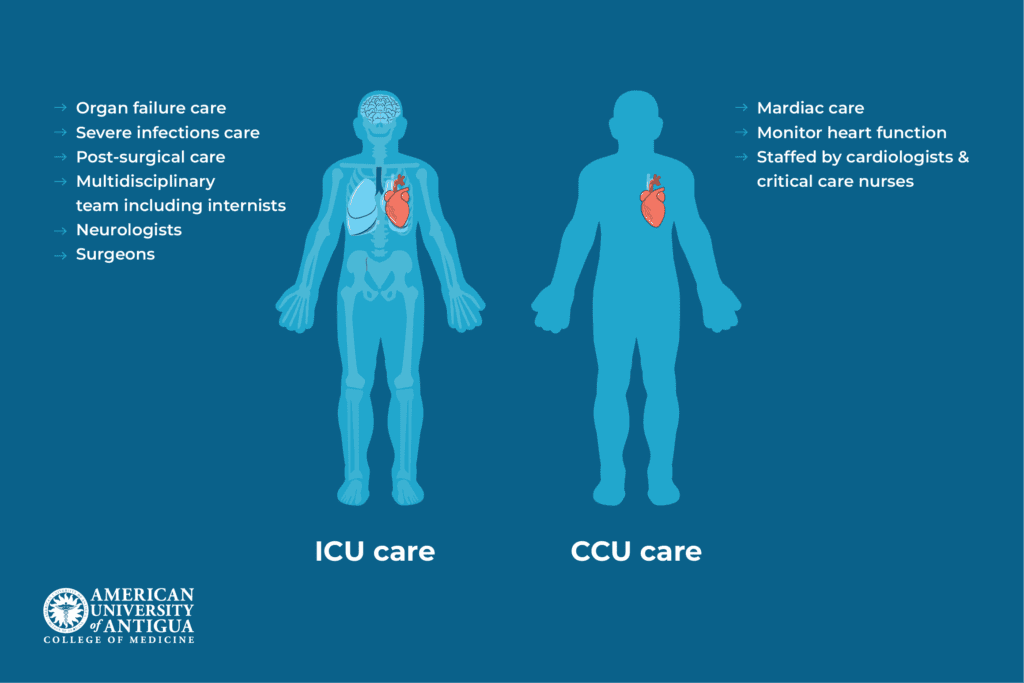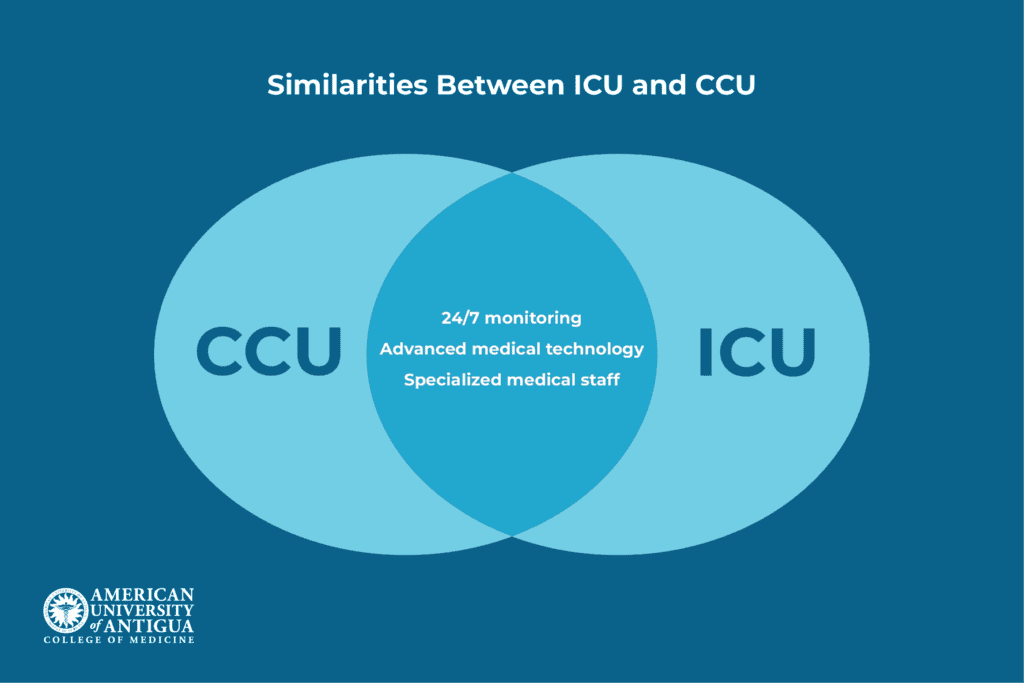Is CCU Different From ICU? Find out the Key Differences
CCU is different from ICU; the first focuses specifically on cardiac care, whereas the latter deals with a broader range of life-threatening conditions affecting multiple organ systems.
Hospitals are made up of many different departments and specialized areas. From surgical wards to maternity units to pediatric care and oncology departments, each one has a purpose.
✅ Request information on AUA's MD program TODAY!
YOUR PATH TO SUCCESS BEGINS HERE
However, within these walls, there are certain areas dedicated to treating patients in the most critical conditions—these are the critical care units. These units are where patients require the most intense, round-the-clock monitoring and life-saving interventions, and they can be divided into different types depending on the conditions they focus on.
If you’re a medical student, you’ll undoubtedly encounter abbreviations like CCU and ICU, both of which are critical care environments.
Just as it’s important to know your options in terms of other specialties, knowing the difference between CCU vs ICU is important. These units may seem similar on the surface, but they serve quite different purposes.
So, let’s explore them, their differences and similarities, so we can help you make an informed choice about what your future in medicine should look like.
What is a CCU?
The CCU, or Coronary Care Unit, is a specialized hospital ward. It’s dedicated to the treatment and monitoring of patients with serious heart-related conditions.
Considering the fact that in the US alone, every year around 805,000 people experience heart attacks, of which 200,000 have already had a heart attack before, it’s important for all hospitals to have CCUs equipped with advanced technology and staffed by medical professionals who are trained in cardiac care.
What is an ICU?
An ICU, or Intensive Care Unit, is another specialized ward within a hospital. This one provides intensive treatment for patients facing a wide range of life-threatening conditions. The ICU unit is staffed by a multidisciplinary team of doctors, nurses, and specialists.
Data shows that, every year, more than 5.7 million patients are admitted to ICU wards in the United States. That represents around 20% of all acute care admissions in the country.
Key Differences Between ICU and CCU

Although both the ICU and CCU are critical care wards, they differ significantly in terms of their focus, which reflects the kind of patient care they provide, the conditions they treat, and the equipment used.
Focus and patient care
So, as seen in their initial descriptions, the focus of each unit is one of the most defining differences. The CCU focuses exclusively on cardiac care. They deal with patients who have experienced heart attacks, heart failure, arrhythmias, or other severe heart conditions. Procedures like angioplasty, stenting, or pacemaker insertions are standard in the CCU, as well as various interventional cardiology techniques.
On the other hand, the ICU treats a much broader range of critical conditions. While heart patients may also be treated in the ICU in certain cases, the unit is more geared toward cases involving multiple organ systems, such as patients who suffer from respiratory failure, severe infections like sepsis, or traumatic injuries.
Patient types
Another difference between ICU and CCU wards is the type of patients they treat. The CCU typically admits individuals with life-threatening cardiac conditions who need constant monitoring of heart function. These patients might require specific interventions like defibrillation, medication administration to stabilize heart rhythms or the use of intra-aortic balloon pumps.
In contrast, as mentioned before, the ICU sees a more varied patient base, including those with organ failure, severe infections, or post-surgical complications. A person recovering from major surgery, such as a liver transplant or emergency trauma surgery, would also typically be monitored in the ICU.
Equipment and monitoring
Equipment and monitoring further differentiate the CCU and ICU. In the CCU, the equipment reflects the focus, and it’s specifically designed to manage heart-related issues. So, ECG machines, defibrillators, intra-aortic balloon pumps, and devices for administering cardiac medications like beta-blockers are most commonly used.
The ICU, however, has a wider variety of equipment to handle more diverse medical needs. Its broader focus means that its equipment must also be suitable for a variety of life-threatening conditions, not just cardiac events.
For example, ventilators are commonly used in order to assist patients with respiratory failure, and dialysis machines support those experiencing kidney failure. In cases of severe heart and lung failure, the ICU might also employ ECMO (extracorporeal membrane oxygenation), to support both heart and lungs.
Training and staff
There are many types of medical professionals in critical care, some work in ICUs, others in CCUs, and in some cases they can go from one to the other, as needed.
The CCU is primarily staffed by cardiologists and critical care nurses with expertise in cardiac care. All these professionals are trained to interpret ECGs, manage arrhythmias, and respond quickly to various cardiac concerns.
The ICU, on the other hand, requires a more multidisciplinary team. Alongside internist doctors, you’ll find respiratory therapists, neurologists, and surgeons who are prepared to manage everything from respiratory failure to neurological emergencies.
Similarities Between ICU and CCU

Despite the apparent differences that arise when comparing the ICU vs. CCU, they also share several key elements that make them so important in hospital care.
Both units are dedicated to saving the lives of critically ill patients, and they do so by maintaining 24/7 monitoring. Regardless of whether the patient is dealing with a heart-related emergency in the CCU or multi-organ failure in the ICU, the fact they are in a critical condition means that in both units they will be continuously observed.
In both units, patients are hooked up to monitors that track their vital signs, typically including heart rate, blood pressure, and oxygen levels, in real-time. This constant surveillance allows medical teams to respond instantly to emergencies or some other changes to their condition.
Additionally, both units are staffed by highly specialized medical professionals. All staff are trained to handle life-threatening situations by being required to complete an extensive amount of education, training, and clinical rotations in critical care environments. This is what guarantees that staff in both units are equipped with the knowledge and skills necessary to help people in critical conditions and perform high-stakes medical procedures even when under pressure.
Among their many skills, the staff in both ICU and CCU must be skilled in teamwork since caring for critically ill patients requires a coordinated effort from multiple medical professionals. Therefore, in both units, doctors, nurses, and other specialists are constantly collaborating with one another to monitor patient progress, adjust treatment plans as needed, and respond to emergencies.
Skills and Knowledge Needed to Work in an ICU vs. CCU
Working in either an ICU or CCU requires a high level of skill and specialized training, as both environments deal with critically ill patients. There are many overlapping skills needed in both roles, such as the aforementioned skill of teamwork, as well as others, such as:
- Advanced patient assessment skills
- Critical thinking
- Decision-making
- Ability to monitor and interpret vital signs
- Communication skills
- Emotional resilience
However, there are certain skills that are more important in one unit than the other. For example, in CCUs, it’s absolutely paramount that healthcare professionals are:
- Proficient in reading and interpreting ECGs
- Able to administer cardiac medications
- Skilled in managing devices like pacemakers and intra-aortic balloon pumps
- Can respond accordingly in cases when resuscitation is needed
Whereas in ICUs, the following skills are prioritized:
- Expertise in adjusting and monitoring ventilators
- Ability to manage patients with multiple organ dysfunction
- Specialized knowledge in managing infections
- Understanding of how to administer and monitor sedatives and analgesics
How to Decide Between ICU and CCU as a Specialty
When deciding between a career in the ICU or CCU, it’s important to reflect on the types of medical conditions and environments you are more interested in. If you find satisfaction in developing specialized expertise and mastering heart-specific treatments, then the CCU could align with your interests.
On the other hand, the ICU might be a better fit if you’re drawn to variety and want to work with a wide range of critical conditions.
To help with such a decision it’s worthwhile to explore both fields through clinical rotations or shadowing opportunities. Spending time in each unit will give you first-hand experience with the daily realities of working in the ICU and CCU and provide insights into your potential future. Throughout your rotations, pay attention to the pace, the type of patients you encounter, and how you respond to the different medical challenges.
It’s worth reiterating that, regardless of whether you end up working in the ICU or CCU, you are guaranteed to be helping people and actually making a difference in many people’s lives.
Conclusion
A career in critical care means that every day, you get to work with patients in their most vulnerable moments and be the one to provide the life-saving care they need most. However, to get to that point, you need the right education and training.
At AUAMED, our Doctor of Medicine program is modeled on the US medical education system and is designed to be learner-centric, equipping you with both the theoretical knowledge and practical clinical skills necessary for success in critical care environments like the ICU and CCU. So, join us and you’ll be one step closer to becoming a hero—saving lives for a living.
Frequently Asked Questions
Does CCU handle more critical cases than ICU?
Some may perceive heart issues as more critical, but both the CCU and ICU handle equally critical cases. When a patient is admitted to either unit, it means their condition requires intensive, life-saving care.
Is CCU considered a step down from ICU in patient care?
No, the CCU is not a step down from the ICU. Both units provide equally intensive and specialized care; it’s their focus that differs.
✅ Request information on AUA's MD program TODAY!
YOUR PATH TO SUCCESS BEGINS HERE
✅ Request information on AUA's MD program TODAY!